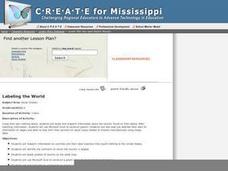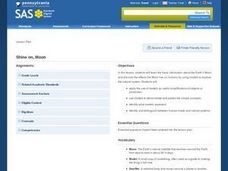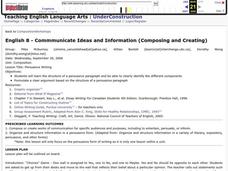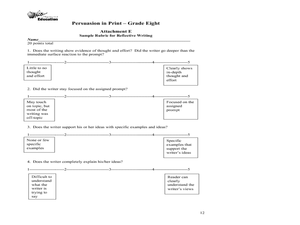Curated OER
Threats to Validity
Students review the components of the scientific habits of mind. In groups, they use this information and relate it to scientific investigations. They develop strategies to evaluate information and evidence and how to question sources...
Curated OER
Labeling the World
Sixth graders conduct research on the countries found on the labels on their clothing. They locate the countries on a map, research the labor practices on countries that export clothing to the U.S., and create a graph using the information.
Curated OER
Fossil Fuels vs. Alternative Fueling Systems
Fourth graders brainstorm the differences between the fossil fuels that people use in their transportation now and what they could use to minimize greenhouse gas emissions. They use a variety of techniques from webquests to writing...
Curated OER
The Stinky Cheese Man and Other Fairly Stupid Tales
Sixth graders demonstrate the ability to process and evaluate content from a variety of sources and apply comprehension skills to the material read. They organize information for practical use and design and develop an informational...
Curated OER
Shine On, Moon
Students explore space science by conducting an experiment in class. In this Moon lesson, students define a list of space science vocabulary and read the book The Moon. Students utilize shoeboxes and string to conduct a sunlight...
Curated OER
Using "Why Mosquitoes Buzz in People's Ears" to Teach Cause and Effect
Students discuss cause and effect relationships and the chain reaction involved before listening to the story "Why Mosquitoes Buzz in People's Ears". Students create flow charts to show the chain reactions of causes and effects in the...
Curated OER
The Cycle of Life
Eighth graders search for rites of passage in their own lives and study rites of other cultural groups in Louisiana and around the world. They assess how to recognize moments of importance in people's lives and find meaning in the stages...
Curated OER
Technology-commected Folklife Lesson Plan: Fables
Learners discuss ways the stories were alike and different. The teacher demonstrate how to draw a Venn diagram using Microsoft Word. They label the two circles and enter the likenesses and differences on the diagram.
Curated OER
Propaganda During World War I
Eighth graders consider how propaganda was used during World War I. In this World War I lesson, 8th graders analyze posters that were used to garner support for World War I. Students use the provided worksheet to analyze the posters.
Curated OER
Maize to Maquiladoras: Movement from Mexico to Arizona
Fourth graders label maps of Arizona and Mexico to show the people, goods, and ideas that have moved between the two places. In this Arizona and Mexico lesson plan, 4th graders summarize the effects of the movement on Arizona life.
Curated OER
Gold Mountain
Students read primary and secondary sources to find jobs as a Chinese immigrant. In groups they create a chart listing jobs for Chinese and write a letter about employment and living conditions to a Chinese friend.
Curated OER
"I Don't Pay Attention to Advertisements? (At least I don't think so?)"
Sixth graders study eight persuasive techniques that occur in a variety of media types. They write a persuasive essay and present it to the class. They create a "new product" for which they produce an advertisement using persuasive...
Curated OER
Can You Find a Solution?
Students explore the topic of public conservation. In this Florida panthers lesson, students read a scenario about the endangered panther and collaborate to plan a way to protect the panther population. Students also participate in a...
Curated OER
Persuasive Writing
Eighth graders study persuasive writing. They analzye an editorial for introductory,body, and concluding sentences. They develop arguments for and against various topics in small groups.
Curated OER
Explaining Factors Causing Conflict and Cooperation
Young scholars discuss what causes conflicts amongst groups especially pertaining to Native American tribes. In this conflicts lesson plan, students have discussion questions that they verbally answer and write in a journal.
Curated OER
Dr. Heidegger's Experiment
What are the pros and cons of prolonging life? Incorporate real-world issues into the study of literature using Dr. Heidegger's Experiment. Through the exploration of pre-determined websites, scholars consider several related literary...
Curated OER
Listening To a Guest Speaker
Pupils review the main points of note-taking to summarize the content of a formal or informal spoken presentation. They hear a guest speaker talk about a pre-arranged topic and take notes during the presentation. Next, they write a...
Curated OER
George Winter Lesson Plan 3
Bring language arts and U.S. history together in this lesson, which prompts middle and high schoolers to gather biographical information about Abraham Lincoln. They compare and contrast information written about his childhood and discuss...
Curated OER
What Does Respect Look Like at Home?
Fourth graders conceptualize the value of respect for self, and give examples and non-examples. They describe how things could have been done differently within the family or the community for non-examples. Students conceptualize the...
Curated OER
Persuasion in Print
Advertisers target teenagers. Groups select three magazine advertisements for similar products, analyze the appeals used in each, create a poster that features the persuasive techniques used, and present their findings to the class. The...
Curated OER
Introduction To OSHA
Young scholars are introduced to The Occupational Safety and Health Act. The find correct OSHA Standards in the 29 CFR 192 and explain their relevance in the workplace.
Curated OER
Media Literacy Vocabulary Lesson
Students participate in an introductory lesson that focuses on communication. The two types of extrapersonal and interpersonal are covered. The lesson uses questions in order to guide the class discussion and writing responses.
Curated OER
Folklore and Oral History
Learners listen to a lecture about the tradition of story telling and oral history. They research three examples of African American and/or Negro Leagues oral tradition. they work in groups of four, and decide on one example from their...
Curated OER
Northern and Southern Differences in 1856
Fourth graders investigate differences between the ideology of the Northern and Southern states in 1856. In this states' history instructional activity, 4th graders examine the needs for slaves in the Southern agricultural economy, and...

























